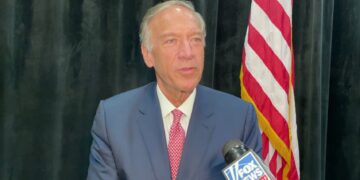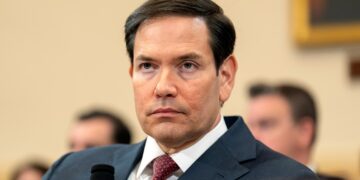On February 24, 2025, Texas Congressman Jodey Arrington introduced a resolution, “Calling an Article V Convention for proposing a Fiscal Responsibility Amendment to the United States Constitution and stipulating ratification by a vote of We the People, and for other purposes,” which was referred to the committee on the judiciary. The resolution states, ”Whereas congressional and State records of plenary applications for amendments on any subject and applications for the single subject of Inflation-Fighting Fiscal Responsibility Amendments compiled by the Article V Library counts Nevada’s ‘continuing’ application, reported February 8, 1979, in the Congressional Record, as the 34th, thus achieving the ‘two thirds’ congressional mandate to call the Convention for proposing amendments; congressional records reported 39 applications by the end of 1979, 40 in 1983, and 42 total applications over time.”
While it is true that Article V of the U.S. Constitution states that “The Congress… on the application of the legislatures of two thirds of the several states, shall call a convention for proposing amendments,” there is a big problem with the claim that the thirty-four-state threshold has been met and Congress shall now call a convention for proposing amendments. The issue can be clearly seen in Congressman Arrington’s resolution itself in the part that states, “and applications for the single subject of Inflation-Fighting Fiscal Responsibility Amendments.” Article V says that Congress shall call a “convention for proposing amendments.” The word “amendments” is plural. This means that while there is a possibility that after a convention is called just a single amendment would be pursued, constitutionally there is no such thing as a convention for proposing a single amendment, only multiple. Therefore, the thirty-four-state threshold has not been met, as those resolutions are invalid!

It isn’t difficult to get caught up in the false hope that a Balanced Budget Amendment would fix America’s spending and debt issues. In personal conversations that this writer has had with Convention of States supporters, when they were asked what they feel the language of the Amendment should be, they couldn’t say anything specific but said that they just wanted something. When pressed further, it was clear that they had not even thought through what the definition of “balanced” would be or how the Amendment itself would be enforced.
Despite the fact that the convention that created our current constitution was a runaway convention, given that the delegates were instructed to amend the Articles of Confederation and instead we ended up with a whole new constitution, Convention of States supporters were not at all worried about the possibility or even likelihood of a “runaway” convention. Some have even suggested the possibility of the states “recalling” delegates if they step out of line. This writer was even reassured by a Wisconsin state senator that if a convention is called, they would follow the exact same procedures as the original constitutional convention.
Some like to cite the 10th Amendment and claim that the states would have the authority to make all the decisions regarding everything that happens at a convention. The reality is that if a convention is called, Congress would be deciding everything, including the specific issues to be addressed, how the delegates are chosen and apportioned, and the rules and procedures of the convention itself. Article 1, Section 8, Clause 18 of the Constitution says, “The Congress shall have Power . . . To make all Laws which shall be necessary and proper for carrying into Execution the foregoing Powers, and all other Powers vested by this Constitution in the Government of the United States, or in any Department or Officer thereof.” Congress is given the power to call a convention, and therefore it would be necessary and proper for Congress to make the decisions regarding how the convention is executed.
To further illustrate this point, if the John Birch Society were to call a convention, it would be necessary and proper for them to organize it ahead of time, put together the rules and procedures, and decide who would be allowed to attend. It obviously would not be up to the individuals and groups attending the convention to make those decisions.
If a Balanced Budget Amendment were added to our constitution, there would most certainly be issues with how it would be implemented. If Congress failed to balance the budget during the first fiscal year after ratification, which would be an almost certain scenario, given that it would take at least a few years to balance the budget even with significant spending cuts, the amendment would quickly lose its moral authority.
All of these issues are significant in themselves, but perhaps the biggest issue that a Balanced Budget Amendment raises is how to come up with the numbers and data that would be used to decide if the budget is projected to balance. Manipulation of numbers has already happened in other areas of government, so why would it be expected to not continue? On August 21, 2024, the Department of Labor revised its jobs numbers to 818,000 fewer jobs than previously reported, as detailed by epicforamerica.org. What would stop the person or organization responsible for reporting the projected revenues and expenditures from manipulating the numbers to make a budget appear that it will balance, when in reality it will not?
There are some areas of government, however, where the numbers are clear, and they do not paint a positive picture for the future. According to a document released by the Congressional Budget Office called The Budget and Economic Outlook 2025 to 2035, “From 2025 to 2035, debt swells as increases in mandatory spending and interest costs outpace growth in revenues. Federal debt held by the public rises from 100 percent of GDP this year to 118 percent in 2035, surpassing its previous high of 106 percent of GDP in 1946…. Federal outlays in 2025 total $7.0 trillion, or 23.3 percent of GDP. They remain close to that level through 2028 and then rise, reaching 24.4 percent of GDP in 2035 (if adjusted to exclude the effects of shifts in the timing of certain payments). The main reasons for that increase are growth in spending for Social Security and Medicare and rising net interest costs.”
Given that Medicare and Social Security are mandatory spending programs that the government is required to fund and they are the main programs contributing to the federal deficit, enacting a Balanced Budget Amendment could actually force massive tax increases that would cripple the economy and make life harder for individuals who are already struggling to cope with the current high levels of inflation. Obamacare was upheld by the Supreme Court because the individual mandate was labeled as a tax. According to that precedent, Congress could pass blanket legislation that includes a mandate to participate in any federal program, including a single-payer health care system, and a Balanced Budget Amendment would force the taxpayers to fund it through higher and higher taxes!
The reality is that for decades and decades, Congress has not properly addressed the issue of spending and debt, even when solutions have been right there in front of them. Several years ago, former Congressman Ron Paul introduced a plan that would have fixed the insolvency issue with Social Security by allowing younger Americans to “opt out.” Unfortunately, it appears that Congress ignored it, and the problem continues to the present day.
The Department of Government Efficiency is currently auditing the federal government, exposing billions upon billions of dollars of wasteful spending that can be eliminated. What DOGE has uncovered shows that Congress has not been doing their job, and a Balanced Budget Amendment would not have changed that. Even after DOGE has uncovered so much opportunity to eliminate spending and work towards balancing the budget, Congress seems to not be taking it seriously.
Congressman Thomas Massie, the only Republican to vote against the continuing resolution to fund the federal government, according to The Gateway Pundit, called it a “UNIPARTY deal” that “doesn’t fund the wall” but “does fund USAID.” Massie continued, “Why are we going to fund all of the waste, fraud, and abuse that DOGE found? Why are we going to cut, copy, and paste that budget?” he questioned… “I thought we were going to get rid of that stuff. Well, it seems like we’re not.”
Since the constitution itself is not the problem, amending it will not fix the problem. The problem is that Congress has not been obeying their oath to uphold the constitution, so naturally the solution would be to hold them accountable and vote out those who continually vote for unconstitutional programs and deficit spending and replace them with representatives who take their oath to the constitution seriously.
Brandon is a freelance journalist based in the metro-Milwaukee area. His work has been featured in Liberty Sentinel Media, Wisconsin Conservative Digest, and Reality News Media. He has worked full-time in politics for six years. This includes leading successful campaigns for legislatures at the state and congressional levels and successful deployments to get bills passed in Kentucky and Texas. In his spare time, he enjoys weightlifting, running, hiking, and listening to classic rock.

































